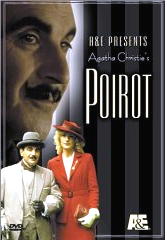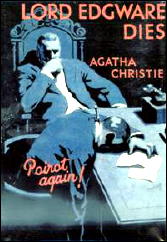Sun 19 Jul 2009
LORD EDGWARE DIES. TV movie/episode of Agatha Christie: Poirot (ITV, A&E).. First shown in the UK on 19 February 2000 [Season 7, Episode 2]. David Suchet (Poirot), Hugh Fraser (Captain Hastings), Philip Jackson (Inspector Japp), Pauline Moran (Miss Lemon), with Helen Grace, John Castle, Fiona Allen, Dominic Guard, Deborah Cornelius, Hannah Yelland, Tim Steed. Based on the novel by Agatha Christie (US title: Thirteen at Dinner). Dramatization: Anthony Horowitz; director: Brian Farnham.

In the comments that follow Geoff Bradley’s review of Toward Zero, David Vineyard and others, including myself, have been discussing the viability of movie and TV adaptations, as compared to the original books upon which they’re based.
Which of course brought to mind (mine, that is) my disappointment in the preceding entry in this series of Hercule Poirot dramatizations, that being The Murder of Roger Ackroyd, which I reviewed here quite some time ago.
Regarding the latter, allow me to quote my slightly younger self: “I certainly did not recognize the shootout in the chemical factory between the killer on one side at the end, and Poirot and Inspector Japp (Philip Jackson) on the other. Good grief. What were they thinking?”
With Lord Edgware Dies, however, they writer, producer and director get another chance to do it right, and except for one or two details, as far as I could tell, they did. I’ve read all of the comments on IMBD, and they all agree. This was an almost perfect reproduction of the book.
In which the wife of Lord Edgware hires Poirot to intercede on her behalf in terms of his agreeing to grant her a divorce. Even though the good man (who is not, otherwise why are there so many possible suspects?) says he’s willing, he’s found dead later the same evening.

The primary suspect is Poirot’s client, played most wonderfully by Helen Grace — she’s supposed to be a woman who attracts men to her like that other Helen, the one from Troy — and she does.
The problem is, she has an alibi, an unshakable one, such as being at a dinner party set for thirteen at exactly the same time the murder takes place. And what’s more, a well-dressed look-alike is seen entering the dead man’s home just before he died.
She’s been framed, and it’s up to Poirot, with a little help from Hastings and Japp, not to mention his long-time secretary, Miss Lemon to sort through the evidence, which insists on piling up, and picking the correct killer out of the long list of possibilities.
Beautifully, beautifully done. Not perfectly done, though. There are some flaws in the story line that won’t come to mind immediately, but they may later. I knew who the killer was early on, but I confess I had my doubts when so many creatively manufactured red herrings did their best to tempt me off the trail.
Books and books, and movies are movies, and the existence of one does not negate the existence of the other. And sometimes the twain do meet. What this filmed episode of Lord Edgeware does do is to show that it can be done with fidelity to the original, that liberties do not have to be taken, and that the end result can also be as delightful and entertaining as the original.
As for Roger Ackroyd, if you’ve read the book, you know what the problems are in terms of converting it to cinematic form. It wouldn’t be easy. But the gunfight in a chemical plant? No way.
July 20th, 2009 at 4:34 am
Scriptwriter Anthony Horowitz was billed by a British newspaper as “the hardest working writer in Britain”. He is also the man behind the FOLEY’S WAR series of TV mysteries, and many spy novels.
I’ve been reading some of his kids’ mysteries, about the Diamond Brothers. His story collection THREE OF DIAMONDS (2003) has a good novella “I Know What You Did Last Wednesday”, which is a take-off on Christie’s AND THEN THERE WERE NONE. The Diamond Brothers are quite funny, with a riot of puns, jokes and zany humor.
July 20th, 2009 at 12:33 pm
Mike
I wish I’d caught the connection between Anthony Horowitz and FOYLE’S WAR while I was writing my comments on the Poirot film yesterday. One would expect nothing less than a fine script adaptation from him on that basis only.
But he seems to have deeply involved with many, many crime dramas on British TV, including many early episodes of MIDSOMER MURDERS.
Thanks also for the reference to the Diamond Brothers, who seem to have escaped my notice until now. I’ll see if I can’t find some of the books without too much difficulty.
A good reference for Horowitz, I think, is his Wikipedia entry: http://en.wikipedia.org/wiki/Anthony_Horowitz
— Steve
July 20th, 2009 at 12:51 pm
Horowitz writes the best selling Alex Rider young adult spy novels and the Diamond brothers, including the highly praised The Falcon’s Malteser. He has also written many of the Poirot adaptations.
I agree this was overall a very good Poirot adaptation. As for Ackroyd, as I’ve said elsewhere, it is hard to imagine anyone pulling off an adaptation that came anywhere near the impact of the book, and without that element there really isn’t much there to work with dramatically unless you are thrilled by Poirot’s gardening.
July 20th, 2009 at 12:55 pm
It took me a long time to learn that what Poirot was growing in Ackroyd as “vegetable marrows”, seem to be what American call pumpkins and zucchini.
July 20th, 2009 at 1:57 pm
I love the the Suchet Poirot. “Lord Edgeware dies” is a good one. It is true that the writers often take some liberty with Christie´s novels, on the other hand they sometimes have elements which even with a lot of goodwill and a lot suspense of disbelief are so laughable today that you just can´t take them seriously. Christie was overly fond on the twist in “Lord Edgeware dies”; at least here it works.
Most of the times the production of Poirot succeeds to streamline the original. “Death on the Nile” is very good, the same is true to some of the lesser known novels. I just hope they can manage to do the Orient Express. Now that would be interesting 🙂
November 15th, 2010 at 4:24 pm
[“I’ve read all of the comments on IMBD, and they all agree. This was an almost perfect reproduction of the book.”]
Almost “perfect” reproduction of the book? Why do people assume that a movie adaptation of a novel has to be “EXACTLY” like the novel in order for it to be perfect? When will people get over this illusion?
[“Most of the times the production of Poirot succeeds to streamline the original. “Death on the Nile†is very good, the same is true to some of the lesser known novels.”]
The 2004 version of “Death on the Nile” is a lot closer to the original novel than the 1978 version. Yet, I still believe that the 1978 version is superior.